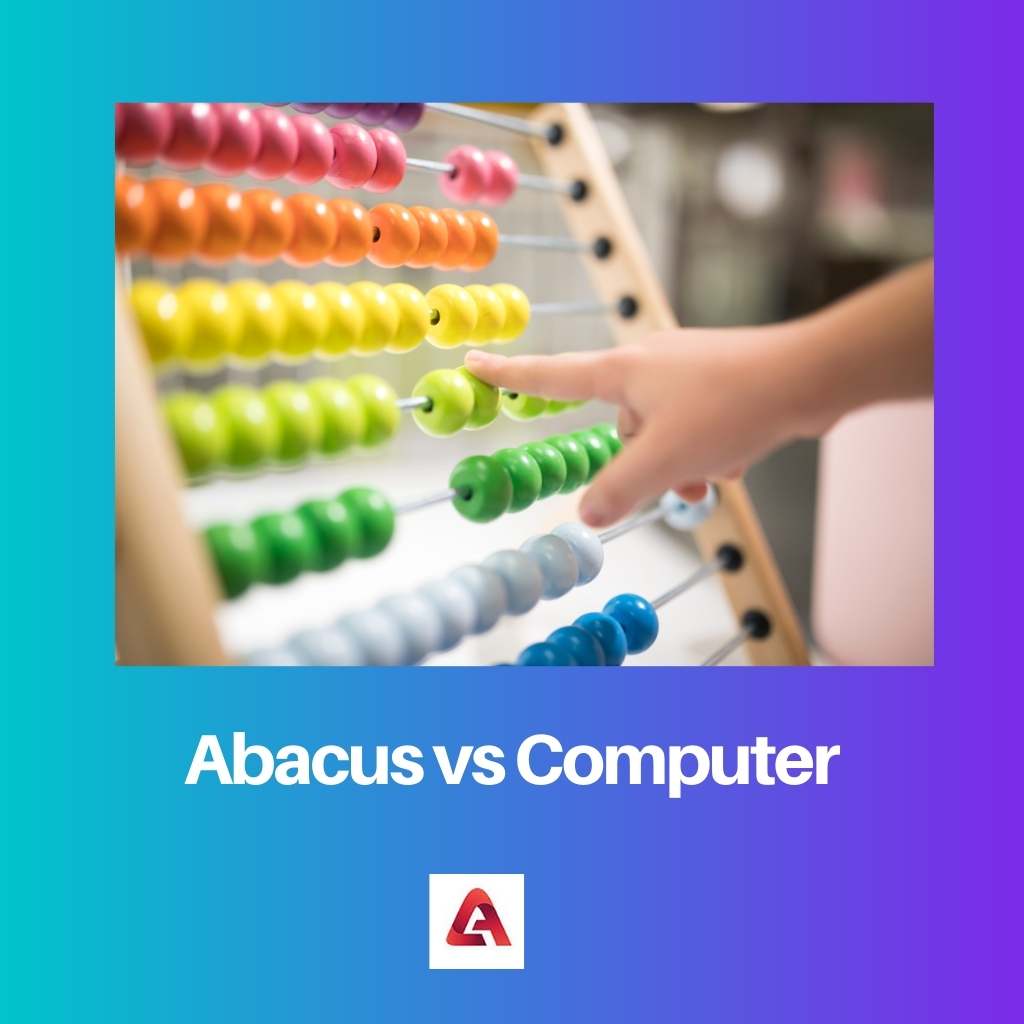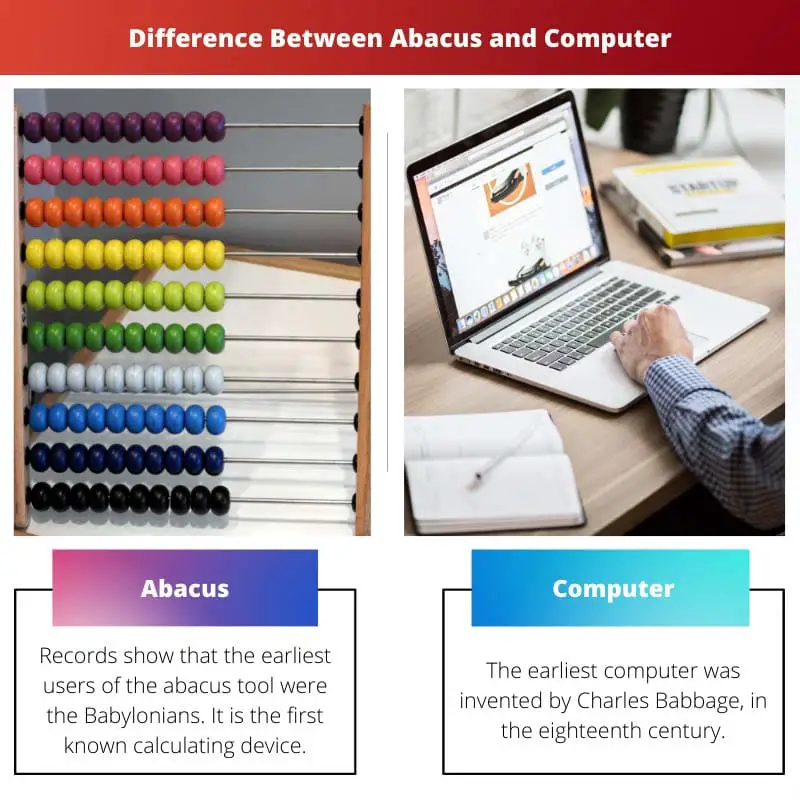Mathematics is considered one of the toughest subjects in the curriculum. This is because, unlike theory subjects, it requires understanding and practical application.
A majority of daily activities are linked to calculations. This gives rise to manual and digital aids for the calculation process to eliminate the chance of miscalculations.
Key Takeaways
- The abacus is an ancient calculating tool that uses beads on rods to represent numbers.
- Computers are advanced electronic devices that perform complex calculations and store vast amounts of information.
- Both tools aid mathematical computations, but computers offer vastly greater speed, capacity, and functionality.
Abacus vs Computer
The difference between an abacus and a computer is that the efficiency of performance varies. The former offers better speed in calculations when compared to the conventional method of using pen and paper. However, it can still not match the speed of computer operations. The efficiency depends on the model configuration and technical specifications.

Records show that the earliest users of the abacus tool were the Babylonians. It is the first known calculating device. The abacus uses materials like wood, stone and has a metal frame.
It allows ease of calculating functions like addition, subtraction, multiplication, and division. With time, the design of the abacus has evolved.
Charles Babbage invented the earliest computer in the eighteenth century. It carried out a series of operations known as programs.
The different parts of the computer use a combination of metals, alloys, and plastics. The technologies used in computers have advanced with time and keep abreast with current trends.
Comparison Table
| Parameters of Comparison | Abacus | Computer |
|---|---|---|
| Use | It is used for mathematical calculations. | Calculations are one of the many functions offered. |
| Key components | Abacus relies on manual operation. | A central processing unit is a core aspect needed. |
| Convenience | It is small and easily portable. | A computer is not portable. |
| Performance | A longer time is taken for calculating. | The speed of calculations is much faster. |
| Accuracy | There may be miscalculations due to human error. | Calculations are accurate and error-free. |
What is Abacus?
Abacus, otherwise known as a counting frame, has been used since ancient times. It can also calculate decimals, square and cube roots of numbers.
The primary parts of the abacus are the external frame, internal rods, and beads. The horizontal partition rod is called the beam. The beads in the upper placement are heaven beads. In the lower position are the earth beads.
A conventional abacus device has seventeen rods with five beads each. The rods have different values, and the beads have different numbers. Chinese and Japanese abaci are popular.
The difference between the two is the difference in bead placement and arrangement.
The Cranmer Abacus was designed to cater to visually challenged individuals. This model is designed so that the beads in the frame do not move arbitrarily, making calculations easy and trouble-free.
At present, there are different levels of abacus learning. This is related to the age categories of the learner. It is popular among the student population due to the advantages presented.
It enhances the child’s imagination, stimulates the brain, and maximizes the speed of the thought process. In addition to helping in focusing, it boosts confidence and establishes a strong knowledge base.

What is Computer?
Computers are products of technological advancement. They are relatively new tools that solve complex arithmetic functions and algorithms. One of the first computers was extremely bulky and heavy, weighing around twenty-seven pounds.
Simple logic is the basis for all problem-solving strategies. Mathematical calculations are a consequence of the processing unit. Calculation encompasses a fraction of what the computer is capable of performing. It allows data transfer with external devices.
Computers use binary functions. The binary system employs two digits, namely, zero and one. It is the easiest interpretation of the electrical signals passed on in a computer.
Algorithms are arithmetic instructions that guide the process of automated responses.
Abacus was a source of inspiration for the creation of the modern computer. The ability to multi-task is one of the highlights of a computer. Data security and reduction in workload are other benefits.
Computers are classified as analogous, digital, and hybrid depending on their capacity to handle data. Based on the size, computers are sub-classified as supercomputers, mainframes, mini frames, microcomputers, and workstations.
Supercomputers are used in advanced research, quantum mechanics, and fuel exploration. They were created to solve complex functions using a combination of numerical and symbolic values. This is a time-consuming process.

Main Differences Between Abacus and Computer
- Abacus is an earlier followed method for arithmetic calculations. The computer is a newer invention that has other functions, including input-output, data processing, and storage.
- The user operates Abacus and relies entirely on the said person. Apart from the CPU, other vital parts of a computer are the motherboard, RAM, SSD, and HDD.
- Abacus is a rectangular frame, and the size makes it convenient to carry around. While a laptop is portable, a computer is not. This is because there are several accessory connections it is heavy.
- Abacus aims at mental calculations, so the speed of performance is higher. Computers use logical gates and programming to arrive at the answer within seconds.
- The possibility of error while performing multiple functions is high. The calculation process in a computer is automatic, needs no external intervention, and has zero errors.

- https://books.google.com/books?hl=en&lr=&id=8jDRAgAAQBAJ&oi=fnd&pg=PP8&dq=abacus&ots=G60vWRQrku&sig=XSkGCpOIDZjn2O9wTpzIwDgsx_o
- https://aip.scitation.org/doi/pdf/10.1063/1.4822551

This article provides a comprehensive analysis of both the abacus and the computer. I personally favor the informative value. It sheds light on their historical significance and technical aspects, which can be insightful for anyone interested in the topic.
I second that. The article gives a clear and thorough insight into both devices. The detailed comparison and the historical background provided are quite enlightening!
The article provides a comprehensive examination of the abacus and computer, offering historical insights and detailed technical comparisons. The depth of information and clarity of presentation make it highly insightful.
Agreed, the analysis provided in the article is exemplary. The thorough comparison and historical context presented make it an enriching read!
Yes, I found the article to be very informative and well-structured. The comprehensive comparison and historical background give a highly insightful view on both devices.
The article is quite thorough and educating! I appreciate the detailed historical contexts for each device, and the comparison table is very informative in discerning the functionalities of both tools.
This article presents a highly detailed analysis of the abacus and the computer, delving into their historical origins and technical differences. It’s a rich resource for understanding the significance and functioning of both devices.
The thorough explanations and comprehensive comparisons make this article an excellent educational tool. The historical contexts and technical insights are captivating and highly enriching.
This article is a commendable resource for understanding both the abacus and computer. The detailed descriptions and historical contexts are highly informative and insightful.
Absolutely, the detailed comparisons and historical insights are invaluable. The article offers a compelling educational resource on both the abacus and the computer.
The article provides a meticulous and enlightening comparison of the abacus and computer, offering comprehensive insights into their functionalities and historical significance.
This article, with its detailed comparison and historical background of the abacus and the computer, is a commendable educational resource. The explanation is comprehensive and very enriching.
Indeed, the article offers a rich and nuanced analysis of both the abacus and the computer. It’s a valuable educational piece with its depth of information and well-structured content.